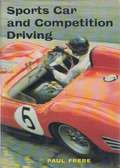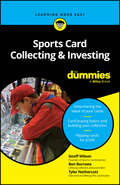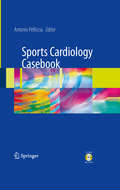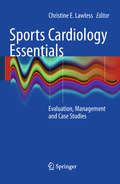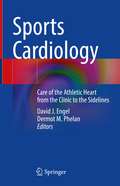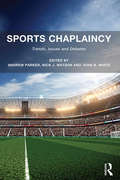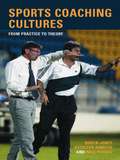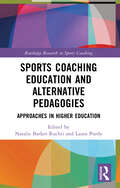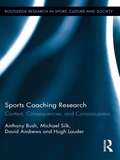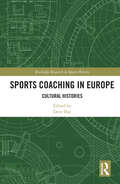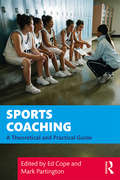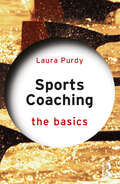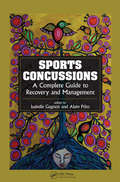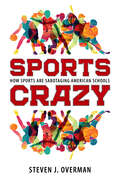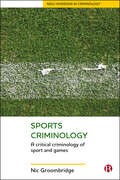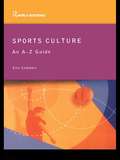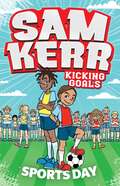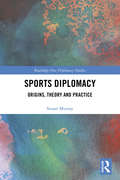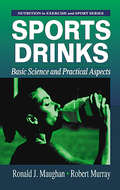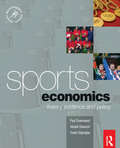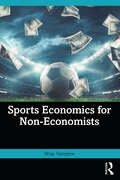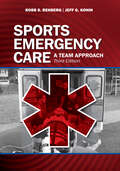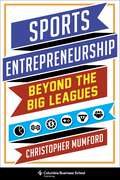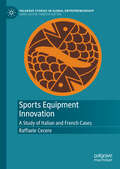- Table View
- List View
Sports Car and Competition Driving
by Paul FrèreThis practical manual been written for the car-owner who is already a competent driver under normal road conditions but who would like to be a better-than-average driver, and especially for the man who wishes to try his hand at competition work--both racing and rallying.Paul Frère--Grand Prix driver and engineer, Le Mans winner and author--gives invaluable instruction based on his many years of experience on the racing circuits of Europe and America. He deals briefly with theoretical matters and then proceeds with his driving lessons: making the most of practice; learning a circuit; racing starts; cut-off and braking points; slides and drifts; taking advantage of road camber; passing and being passed; slipstreaming; driving under wet and icy conditions and racing at night. He also gives practical advice on race tactics, flag marshals, time keeping, pit signals, race wear, seat belts, the choice of gear ratios and tyres and the different problems posed by road and track racing.With the aid of 60 photographs and diagrams M. Frère explains the correct line to take on various types of corners and why, the effects of peculiarities of surface, and analyses the forces acting on a car in cornering.The book is "required reading" for every ambitious driver in Club and Formula Junior racing and for Rallymen.
Sports Card Collecting & Investing For Dummies
by Geoff Wilson Ben Burrows Tyler NethercottBecome a part of the growing sports card trading community Sports Card Collecting & Investing For Dummies will teach you how to start or resume collecting, how to trade, sell, grade, and protect your cards. This is a comprehensive yet easy-to-read breakdown of the sports card hobby and its many nuances. You’ll learn the basics and get up to speed on the recent influx of new brands, companies, investors, influencers, and technologies that have completely reshaped the community. The popularity of sports cards as an alternative investment is at an all-time high, and this Dummies guide helps you budget and make smart trades. The anatomy of a sports card, spotting card damage, grading scales, buying safely, using trusted marketplaces, building your collection, pricing and selling your cards, avoiding scams—it’s all in here. Become a savvy card collector, the easy way. Learn the ins and outs of trading sports cards as a collector and an investor Determine the value of your cards and discover where to find rare deals Stay safe while buying and selling from local dealers, with online marketplaces, and at in-person events Become a part of the collector communityBeginners of all ages who want to start (or resume) collecting sports cards can find all the must-know info in the pages of Sports Card Collecting & Investing For Dummies.
Sports Cardiology Casebook
by Antonio PellicciaComparatively little is known about the risk of sudden death associated with exercise in young competitive athletes, and whether the benefits of sports activity outweigh the hazards of exercise-related fatal events is a clinical dilemma. This is only a small part of the story, however, as there are considerable effects of exercise whether it be at a competitive level or on a 'leisure' level on patients of all ages. This in itself is of massive importance to the cardiac patient population as exercise is a key component of effective recovery and recommended as central in the prevention of much cardiac disease.
Sports Cardiology Essentials
by Christine E. LawlessThis book presents an invaluable symptoms-based approach to sports cardiology for sports medicine physicians, primary care physicians, and cardiologists. Edited by an authority in the field, the text offers sought-after insight on the cardiac health of athletes. Case studies are featured throughout to further understanding and the integration of concepts into daily practice. With contributions by both sports medicine physicians and cardiologists, this timely book bridges the gap between disciplines and is an unparalleled resource for those looking to effectively manage the cardiac health of active patients.
Sports Cardiology: Care of the Athletic Heart from the Clinic to the Sidelines
by David J. Engel Dermot M. PhelanProviding a critical update and review of salient topics needed for the proper cardiac evaluation and care of athletes, this text is designed to be the most up-to-date and practical manual for all health care providers who evaluate and treat athletes, including sports cardiologists, general cardiologists, sports medicine specialists, team doctors and athletic trainers. The book is divided into three key sections. The first section discusses essential topics pertaining to the pre-participation cardiac screening of athletes, providing a framework for how best to perform pre-participation cardiac evaluations and optimize the interpretation of cardiac screening test results, and a guide to assist the streamlining of appropriate downstream testing when required. The second section reviews the management and care of athletes with specific, existing cardiovascular disorders, providing the reader with fundamental principles to help recognize and advise levels of sport participation to athletes with these disorders. The final section deals with acute sideline management of the symptomatic athlete and will again provide practical algorithms for cardiologists and non-cardiologists alike who are responsible for athlete health and safety in the sports arenas and training facilities. Written and edited by highly regarded experts in the field of sports cardiology, including several cardiologists who are collegiate and professional team physicians and who work with professional sports organizations on developing policies for cardiac screening and monitoring, Sports Cardiology is an excellent practical resource for all clinicians working in the field.
Sports Chaplaincy: Trends, Issues and Debates
by Andrew Parker John B. White Nick J. WatsonThis ground-breaking book provides an in-depth analysis of the theory and practice of sports chaplaincy in a global context. Written in an accessible style, yet based on academic evidence and theory, the contributors include those leading major national chaplaincy organisations located in the UK, US, Australia and Continental Europe, as well as chaplains and sport psychologists working in elite and amateur sport and those involved in teaching pastoral theology. Providing a rich and informative source of knowledge and inspiration for practitioners, athletes, academics and those interested in the general relationship between sport and faith, contributors also address the provision of sports chaplaincy at sporting mega-events, including the Olympic Games. This much needed overview of chaplaincy provision in sport across a range of national and international contexts and settings, including both catholic and protestant perspectives, is the first collection of its kind to bring together leading scholars in sports chaplaincy with a view to providing professional accreditation and training amidst the fast-emerging field of sports theology.
Sports Coaching Cultures: From Practice to Theory
by Paul Potrac Kathleen M. Armour Robyn Jones'The art of coaching is recognising the situation, recognising the people and responding to the people you are working with... that's the big thing, to handle people'. Steve Harrison, Coach, Middlesbrough Football Club. Responding to the fast growing subject in academic sports departments, this groundbreaking new coaching studies text offers a view that focuses the coach as a person and the coaching practice as a complex social encounter. Unlike existing titles in the field which look at coaching as a science, this book examines the personalities, histories, relationships and individual styles of eight coaches at the top of their profession. One-to-one interviews with some of the best-known and respected elite sports coaches include Steve Harrison, Hope Powell and Graham Taylor from football; Ian McGeechan and Bob Dwyer from rugby; Di Bass from swimming; Lois Muir from netball; and Peter Stanley from athletics; and form the basis for subsequent exploration of four key themes in sports coaching: * coaching pedagogy * the coach's role * the coach's interaction with athletes * the coach's power. This text will be of significant interest to students of coaching science and sports science, and will appeal to the considerable body of amateur sports coaches with an interest in the styles of those at the top.
Sports Coaching Education and Alternative Pedagogies: Approaches in Higher Education (Routledge Research in Sports Coaching)
by Natalie Barker-RuchtiSports Coaching Education: Applying Innovative Pedagogies theorises alternative pedagogies and presents examples of what such teaching looks like in sports coaching higher education. To do this, this new volume outlines the teaching goals of higher education coach education, summarises the limitations of this education that research has demonstrated, and presents alternative pedagogy as a way forward. The book then turns to showcasing work by an international selection of authors practicing alternative pedagogies that focus on a range of topical issues relevant to sports coaching such as; ethics; power; safeguarding/abuse; sustainability gender/sexuality; race/ethnicity; pain/injury, the authors of each of the international chapters outline the alternative pedagogical approach they employ in their teaching and present exemplary teaching materials that can be used by educators.Alternative or non-traditional pedagogies are strategies of delivery that are becoming more popular in undergraduate and postgraduate coach education, Sports Coaching Education: Applying Innovative Pedagogies raises attention to contemporary issues in sports coaching and alternative pedagogies of delivery for university coach education students.Using alternative pedagogies, the book presents coach education teaching materials on a range of topical issues that higher education scholars can implement in their teaching and will be key reading for academics, researchers and students in the areas of sport coaching, sport education and the related disciplines.
Sports Coaching Research: Context, Consequences, and Consciousness (Routledge Research in Sport, Culture and Society #20)
by David Andrews Michael Silk Hugh Lauder Anthony BushThis book raises critical questions about the explanatory framework guiding sports coaching research and presents a new conceptualization for research in the field. Through mapping and contextualizing sports coaching research within a corporatized higher education, the dominant or legitimate forms of sports coaching knowledge are problematized and a new vision of the field, which is socially and culturally responsive, communitarian and justice-oriented emerges.
Sports Coaching in Europe: Cultural Histories (Routledge Research in Sports History)
by Dave DayThis book explores the historical development of coaching traditions across Europe, placing national approaches to coaching within their cultural and political context. Sports coaching is a social practice that has been shaped by its cultural context, resulting in different countries being characterized by different coaching traditions. By helping us to understand the history of coaching across Europe, this book allows us to better understand both the history of sport and the cultural and social history of Western European nations. Drawing on cutting-edge historical research by international scholars, the book presents studies of coaching cultures in France, Spain, Italy, the Netherlands, Sweden, Norway and the United Kingdom. It explores how sporting histories, cultural attitudes, and social contexts resulted in distinctive coaching heritages, which were further shaped through coach migration and the adoption of elements of other countries’ coaching structures. This book explores these phenomena to provide critical evidence of the historical impact of culture on the development of sports coaching. The book offers insight into the characteristics of European coaching traditions. It will be fascinating reading for academics in sports history, sports and coaching studies, gender studies, and transnational studies, as well as those with an interest in British or European history and social and cultural history.
Sports Coaching: A Theoretical and Practical Guide
by Ed Cope Mark PartingtonThe application of the theoretical underpinnings of coaching to practice is a central concern in sport. How should academic research seek to inform applied practice, and how should practising coaches integrate research into their professional activities? Sports Coaching: A Theoretical and Practical Guide is the first book to truly integrate academic research on sports coaching with an assessment of and recommendations for applied practice. With every chapter written by a coaching researcher and a practising coach, the book clearly and concisely introduces the academic evidence base and discusses how and why theory should be integrated into practice. Made up of sections on coaching practice, coach education and development, the use of sport science support and coaching special populations, the book constitutes a comprehensive guide to the theory and practice of sports coaching. Chapters are clearly and consistently structured, allowing students and coaches opportunity to gain a firm understanding of the core theoretical principles of sports coaching and the ways in which they can guide practice. The book is a vital resource for any sports coaching student, researcher or practitioner to develop their evidence-informed practice.
Sports Coaching: The Basics (The Basics)
by Laura PurdySports Coaching: The Basics is an engaging and provocative introduction to sports coaching which combines coaches’ views and experiences of their work with discussions and topical issues that feature in this fast-growing field. In doing so, coaches are placed at the centre of the discussions relating to philosophical, historical, sociological, psychological and pedagogical interpretations of contemporary practice. Consequently, the book prompts questions such as: What is coaching? What does it mean to be a coach? How do coaches influence athletes/players? How do coaches learn? What is it like to be a coach? In considering these questions, readers are encouraged to reflect upon their experiences of coaching and to start conversations with others about coaches’ work. Therefore, the book is of use for coaches, those interested in studying sports coaching, and coach educators or facilitators of coach learning initiatives.
Sports Concussions: A Complete Guide to Recovery and Management
by Isabelle Gagnon Alain PtitoSport-related concussions have become an increasingly important topic as evidenced by recent media attention. Due in large part to the complex nature of concussive injuries, there is great discrepancy in the effect these injuries have on individual functioning and the type and nature of services that best facilitate recovery. This book is intended as a complete reference guide dealing with sports-related concussions.
Sports Crazy: How Sports Are Sabotaging American Schools
by Steven J. OvermanSports Crazy: How Sports Are Sabotaging American Schools exposes the excesses of middle and high school sports and the detrimental effects our sports obsession has on American education. Institutions are increasingly emulating college and professional sports models and losing sight of a host of educational and health goals.Steven J. Overman describes how this agenda is driven largely by partisan fans and parents of athletes who exert an inordinate influence on school priorities, and he explains how and why school administrators shockingly and consistently capitulate to these demands. The author underscores the incongruity of public schools involved in an entertainment business and the effects this diversion has on academic integrity, learning, life experience, and overall educational outcomes.Overman examines out-of-control school sports within the context of a school’s educational mission and curriculum, with telling reference to impacts on physical education. He explores as well the outsized place of interscholastic sports beyond the classroom and scrutinizes the distorted relationship between intramural or recreational sports and elitist, varsity athletics. Overman’s chapter on tackle football explains many reasons why this sport should be eliminated from the school extracurriculum and replaced by flag or touch football.Overman presents a brief history of interscholastic sports, and he compares and contrasts the American experience of school-sponsored sport to the European model of community-based clubs. Which approach better serves students? Overman recommends reforms in the context of a radical proposal to phase out interscholastic sports in favor of an intramural or club model. This approach would alleviate such problems as elitism and gender bias and reign in hypercompetitiveness while freeing schools to educate students rather than provide public entertainment.
Sports Criminology: A Critical Criminology of Sport and Games (New Horizons in Criminology)
by Nic GroombridgeThis is the first book to provide a critical criminological perspective on sport and the connections between sport and crime. It draws on the inter-disciplinary nature of criminology and incorporates emerging perspectives like social harm, gender and sexuality, and green criminology. Written from an international perspective, it covers topics including sports scandals and the possibility of crime prevention through sport. American football, boxing, soccer and sumo are all examined. The book considers both sports law and the sociology of sport and will be essential reading for students and academics in these fields.
Sports Culture: An A-Z Guide
by Ellis CashmoreWe live in a culture in which sports play an important role. The growth in broadcasting, merchandising, iconography and the commercialization of sports has led to an increasing interest in the emerging field of sports culture.This book examines individual issues, people, artefacts, events and organizations in their historical, social and cultural contexts. Coverage is wide-ranging with more than 170 entries including:aggressionBosman Casecorruptiondrugseating disordersFever PitchField of DreamsMichael JordanDon Kingleft-handednessnationalismpaternityracismRaging BullrivalriestobaccoThe book also includes suggestions for further reading to help with further study, and a comprehensive index.
Sports Day: Sam Kerr: Kicking Goals #3
by Fiona Harris Sam KerrMatildas superstar Sam Kerr&’s incredible story! It&’s official! Eleven-year-old Sam Kerr is a fully-fledged soccer tragic! So, when the school&’s annual Sports Day comes around, she is disappointed when soccer isn&’t on the list of activities. Sam goes on a mission to get her beloved game added to the program. With help from her best friends, Indi and Dylan, she petitions her classmates to create the first-ever soccer team in the history of her school. But will Chelsea stir up trouble and ruin everything? On the home front, Sam and her siblings are organising a surprise party for their parents&’ wedding anniversary. But things aren&’t going to plan! And with her team&’s grand final just around the corner, there&’s a lot to deal with … even for a soccer superstar in the making!
Sports Diplomacy: Origins, Theory and Practice (Routledge New Diplomacy Studies)
by Stuart MurrayThis book offers an accessible overview of the role sport plays in international relations and diplomacy. Sports diplomacy has previously been defined as an old but under-studied aspect of the estranged relations between peoples, nations and states. These days, it is better understood as the conscious, strategic and ongoing use of sport, sportspeople and sporting events by state and non-state actors to advance policy, trade, development, education, image, reputation, brand, and people-to-people links. In order to better understand the many occasions where sport and diplomacy overlap, this book presents four new, inter-disciplinary and theoretical categories of sports diplomacy: traditional, ‘new’, sport-as-diplomacy, and sports anti-diplomacy. These categories are further validated by a large number of case studies, ranging from the Ancient Olympiad to the recent appearance of esoteric, government sports diplomacy strategies, and beyond, to the activities of non-state sporting actors such as F.C. Barcelona, Colin Kaepernick and the digital world of e-sports. As a result, the landscape of sports diplomacy becomes clearer, as do the pitfalls and limitations of using sport as a diplomatic tool. This book will be of much interest to students of diplomacy, foreign policy, sports studies, and International Relations in general.
Sports Drinks: Basic Science and Practical Aspects
by Ronald J. Maughan Robert MurrayCan sports drinks improve the way you play and exercise? Athletes-both competitive and recreational-turn to the consumption of sports drinks to optimize their performance. A volume in the Nutrition in Exercise and Sports Series, Sports Drinks: Basic Science and Practical Aspects provides a review of current knowledge on issues relating to the formu
Sports Economics
by Roger D. BlairSports Economics, the most comprehensive textbook in the field by celebrated economist Roger D. Blair, focuses primarily on the business and economics aspects of major professional sports and the NCAA. It employs the basic principles of economics to address issues such as the organization of leagues, pricing, advertising and broadcasting as well as the labor market in sports. Among its novel features is the candid coverage of the image and integrity of players, teams, managers and the leagues themselves, including cases of gambling, cheating, misconduct and steroids. Blair explains how economic decisions are made under conditions of uncertainty using the well-known expected utility model and makes extensive use of present value concepts to analyze investment decisions. Numerous examples are drawn from the daily press. The text offers ample boxes to illustrate sports themes, as well as extensive use of diagrams, tables, problem sets and research questions.
Sports Economics (Sport Management Series)
by Paul Downward Alistair Dawson Trudo DejongheSports Economics is the ideal introduction for all sport management and sport policy students and those for whom economics is a relatively new area of study. The book will also provide an ideal introduction to sports economics for economics students new to the area. Specifically designed to make economics accessible the context of sport is the focus of analysis, ensuring that this book is lively, accessible and approachable. The full scope of the sports economy is examined, covering the three main arenas in which sport takes place - mass participation, professional sports and sports events. The key elements of the economic representation of these three markets are considered, such as the underlying demand for and supply of these sports, together with the main policy issues affecting them Whilst truly international in scope, it focuses particularly on specific comparisons between the US, the UK and mainland Europe. The breadth of discussion and international emphasis is brought to life by a detailed discussion of the evidence throughout the book to illustrate the key themes discussed – ideal for both lecturer and student. Reflection questions and boxes are also used in chapters to prompt the reader to think about specific points as well as to provide the context for specific theoretical or empirical contributions that have been used to analyze sport.
Sports Economics for Non-Economists
by Wray VamplewThis book cuts through the jargon and complicated formulae to focus on the key concepts in sports economics, introducing the fundamentals in a concise and engaging way to give the reader without a background in economics the tools with which to read and apply sports economics in their work. Full of real-world cases and stories, the book offers a short economic history of sport and explains the economic foundations of the world of sport today, from local leagues to mega-events. Covering both amateur and professional sports, it explores and explains the most important issues in contemporary sports economics, from player transfer markets and the rise of women’s sports to the spending behaviour of fans and the growing shadow of corruption. A fascinating read for any student, researcher or practitioner working in sport, or for the general reader who wants to understand the background to many of the most important stories in sport today, this is the only book on sports economics that you will ever need.
Sports Emergency Care: A Team Approach
by Jeff G. Konin Robb RehbergFor more than a decade, Sports Emergency Care: A Team Approach has filled a void in athletic training education on the subject of emergency care. Now, this updated Third Edition continues to pave the way to prepare athletic training students beyond traditional first aid training as well as providing specific information on emergency situations in sports for emergency medical services (EMS) professionals. In this updated Third Edition, Dr. Robb S. Rehberg and Dr. Jeff G. Konin, along with their 13 contributors, have created a resource that can be used in athletic training education programs as a core text in a sports emergency care course; a supplemental text in several courses that address immediate care within an athletic training education curriculum; and it can be used by EMS educators in developing continuing education programs for prehospital providers. Some of the topics included in the Third Edition: Assessment of Sports Emergencies Cardiovascular Emergencies Management of Traumatic Brain Injury Fractures and Soft Tissue Injuries Managing Mental Health Emergencies Care of Athletes with Disabilities Emergencies in Sports for the Aging Athlete Regardless of discipline, it is important for all health care providers caring for ill or injured athletes to be knowledgeable and proficient in managing sports emergencies. This ability can only be achieved through preparation and practice, and Sports Emergency Care: A Team Approach, Third Edition continues to be a groundbreaking text that gives access to the essential resources health care providers need to address sports emergencies. This includes but is not limited to athletic trainers, emergency medical technicians and paramedics, and physicians.From the Foreword: “Emergencies can occur anytime and anywhere in sports, including at a practice or on the bus traveling to an event. After nearly 40 years as a professional sports athletic trainer, these emergency moments give me pause. Preparation is the key to successful outcomes in all emergencies.” —Ronnie P. Barnes, MS, ATC Senior Vice President, Medical Services Head Athletic Trainer New York Football Giants
Sports Entrepreneurship: Beyond the Big Leagues
by Christopher MumfordThe business side of sports isn’t just the established terrain of NFL, NBA, and MLB teams and their billionaire owners. Entrepreneurs are launching dynamic new businesses that are transforming the broader sports landscape. What are the up-and-coming opportunities and high-growth areas for start-ups today?This book is for anyone who dreams of starting a sports business. Christopher Mumford explores the state of the game in data analytics, sports betting, eSports, youth sports, fitness, and the fan experience. He surveys the key players in each sector, identifying possibilities and constraints for new entrants. Interviews with figures such as the creator of a “Bloomberg platform for soccer,” a professional sports bettor, and the founder of a fantasy-sports-focused analytics company add vital insight. Mumford also shares the stories of his own sports start-ups and offers advice based on these experiences.Sports Entrepreneurship details practical step-by-step methods for turning an idea into an enterprise. Mumford guides readers through an actionable framework: map out interests and goals, recognize opportunities, get feedback from users, and accelerate growth. Written for a broad audience, from practitioners seeking to jump-start their next big idea to students in sports management and entrepreneurship, this book is an indispensable guide to new opportunities in the sports industry.
Sports Equipment Innovation: A Study of Italian and French Cases (Palgrave Studies in Global Entrepreneurship)
by Raffaele CecereThis book investigates the innovative trajectories of sports companies in different cultural and geographical contexts and analyzes how they manage the knowledge obtained from collaboration with end users, suppliers, and their own experiences. In doing so, it presents an empirical analysis with in-depth interviews with experts in the innovative field of the following companies involved in sports equipment: Keyena, Sherco, Francus, Picture Organic Clothing, Macron, Dainese, Mondo, La Sportiva, BasicNet, and Pirelli. With this, the book focuses on how companies that produce goods and services for sport implement innovative processes, and is aimed at offering a tool for scholars, managers, and entrepreneurs involved in the sports industry. To achieve this, different types of analysis were conducted, i.e. both literature and empirical analysis. A theoretical model and its validation through the study of practical cases is the added value of this book in this field.
